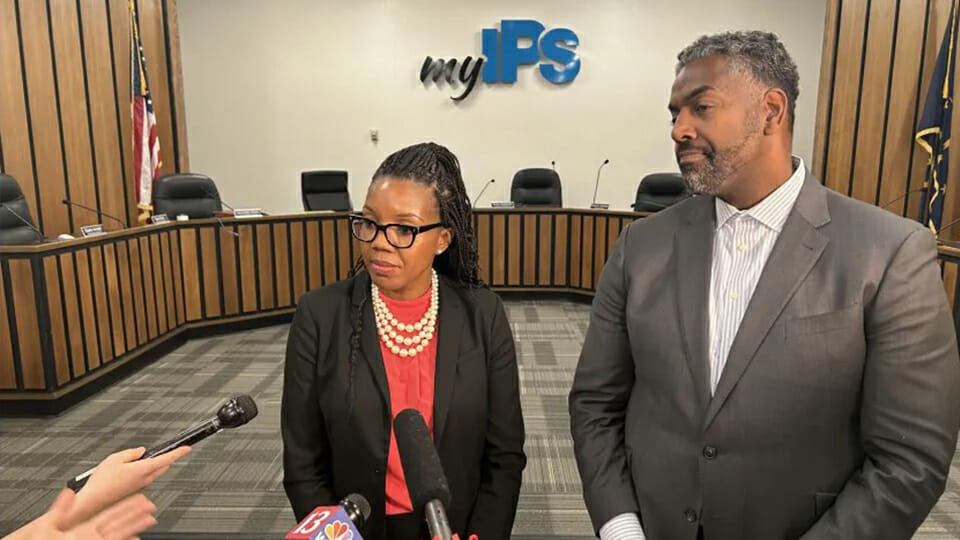IPS to implement overhaul without new taxes for operating costs — for now
Subscriber Benefit
As a subscriber you can listen to articles at work, in the car, or while you work out. Subscribe Now
Indianapolis Public Schools will implement all of its overhaul known as Rebuilding Stronger without a May referendum for operating expenses, a tax increase the district had touted as key to its plan to provide a quality education to all students.
The overhaul approved in November reconfigures grades, closes six schools, and expands specialized academic programs in an effort that officials say will create more great schools and prioritize equity. The district initially indicated that the plan would require two tax increases — a referendum for operating expenses and one for capital expenses.
The plan was temporarily thwarted when the board withdrew its plan to place a $413.6 million referendum for operating expenses on the May ballot, following significant pushback from the charter school sector. Charter schools sought more funding from the operating referendum, while IPS said it would only share revenue with charters considered a part of its autonomous Innovation Network.
But in an announcement on Thursday, the district said it will cut costs in central services and operations to implement the entire Rebuilding Stronger plan, which requires grade reconfigurations for elementary and middle schools to begin in 2024-25.
The district did not specify how much it would save. But Superintendent Aleesia Johnson estimated that fully funding investments in academic programs would amount to roughly $9 million.
The operating referendum was meant to fund the expansion of academic programs and offerings such as art and music. It was also meant to fund teacher pay amid a highly competitive hiring environment.
IPS has enough funding to fund the plan temporarily, but not for the long term, the district said in its announcement.
“We’ve been doing the detailed work over the past several weeks to figure out if we could execute our full Rebuilding Stronger plan given our budget realities — and without seeking an operating referendum this May,” Johnson said in a video posted on Thursday. “And, while we know there are number of factors at the state level that can ultimately impact this timeline, my goal then remains my goal today — to deliver on what this community most values for our students, our teachers, and our families, while also making sure we have the money we need to stay on a sustainable path.”
But the district still stressed that it needs a solution for funding by 2026, when the district’s current referendum for operating expenses will expire.
In her remarks, Johnson expressed an urgency to implement the plan for high-quality options for all students.
“I refuse to ask any student to wait any longer than necessary for Algebra or computer science or art or music. I refuse to keep sending students to schools in buildings that are so overdue for upgrades,” Johnson said. “And I refuse to lose the genius and talent of any more of our students to neighboring districts or schools while we wait to make ours excellent.”
The district said it will make teacher and support staff pay a priority in order to maintain competitive salaries in Marion County.
“We’re going to be prudent and intentional with every dollar from the state to value the people in our schools,” the district said in a statement. “But if we want to sustain our ability to be competitive in the long-term, and keep our almost 90% employee retention, we’re going to need an operating referendum.”
The district hopes the plan will ultimately help the district run more effectively as it loses students and the charter sector grows. Traditional K-8 schools will separate into elementary and middle schools, a move that officials say will help bring more offerings to middle school students.
The reconfiguration will provide band and orchestra, world language, and Algebra I to all middle school students. Less than half of middle schoolers currently have access to those offerings.
Rebuilding Stronger will also double the number of seats in specialized programs that produce strong academic outcomes or are in high demand, such as International Baccalaureate, Montessori, and Butler Lab.
In 2018, the district postponed a referendum after criticism from the business sector, then lowered its proposed tax increase, which voters approved on the November ballot.
The district’s $410 million referendum for capital expenses is on the ballot for May.
Amelia Pak-Harvey covers Indianapolis and Marion County schools for Chalkbeat Indiana.
